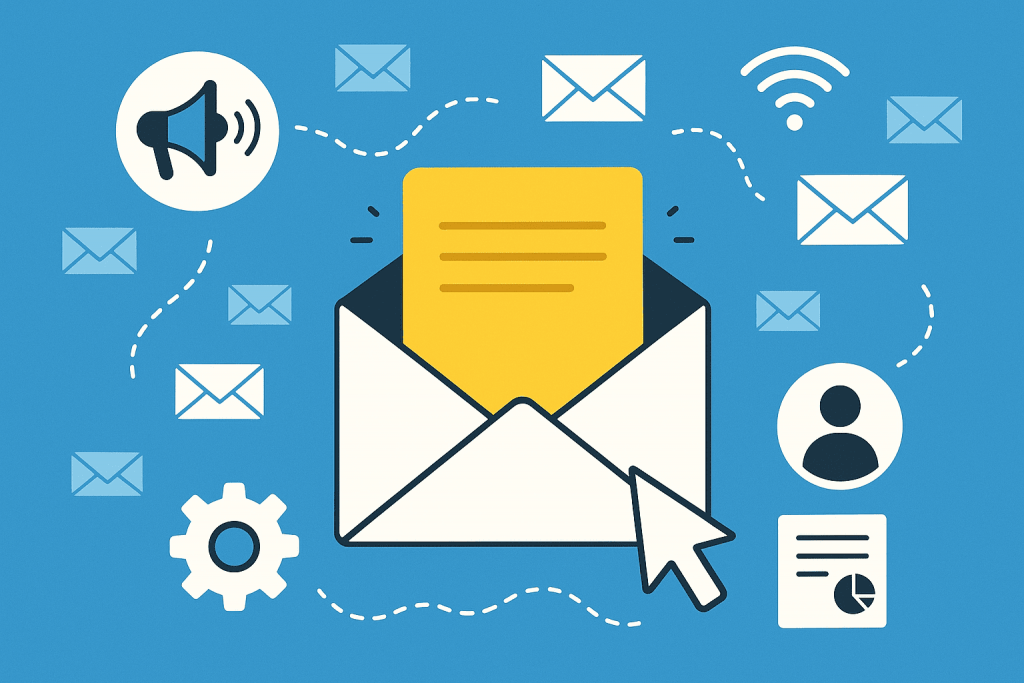
Email newsletters are not just a marketing tool — they’re an effective way to build relationships with customers. Through email, companies share news, promotions, and product updates, invite collaboration, or offer useful advice. However, many users hesitate to start email campaigns on their own because they believe it’s too complicated: domain setup, DNS, templates, servers… Modern platforms remove these barriers — they automate everything and let you create professional campaigns even without technical skills.
Mailchimp — the most popular service to start with
Mailchimp has become synonymous with email marketing. Its main advantage is simplicity. The interface is intuitive, and the email editor works on a drag-and-drop principle. You don’t need to know HTML or CSS to create a stylish message. Mailchimp allows you to upload contacts, segment your audience, send automated series of emails, and track results with detailed analytics.
The free plan is great for freelancers or small businesses — it includes basic features, several thousand emails per month, and ready-made templates. For those who need more automation or integrations, paid plans offer extended functionality.
MailerLite — minimalism and functionality
MailerLite is perfect for those who value a clean interface without unnecessary buttons. It’s a simple yet powerful tool that supports automation, landing page creation, and signup forms.
In its email builder, you can easily combine text, images, buttons, and blocks. After sending, MailerLite shows how many emails were opened, which subjects performed best, and which links received the most clicks. One big advantage is its Ukrainian and Russian localization, making it even easier to use.
The free plan allows up to 12,000 emails per month for up to 1,000 subscribers — more than enough for most small projects.
Brevo — a modern alternative with CRM features
Brevo (formerly Sendinblue) has evolved into more than just an email platform — it now includes CRM tools. This means you can store client data, contact history, reminders, and even manage sales directly within the platform.
For email marketing, Brevo offers adaptive templates, automated email sequences, and audience segmentation based on user behavior. It’s ideal for creating personalized campaigns like “come back to the site” or “your discount is valid for one more day.”
Integration with WordPress, Shopify, WooCommerce, or CRM systems takes just a few clicks, making Brevo a convenient option for small businesses.
GetResponse — for those who want more control
GetResponse is a professional-grade platform for users who already have some experience and need advanced analytics, webinars, or complex automation. The service lets you create newsletters, landing pages, sales funnels, and even dedicated campaign pages.
Its key strength lies in flexibility. You can set behavioral triggers — for example, if a user opens an email but doesn’t click a link, the system will automatically send them a different message. This approach helps improve conversions and retain audience attention.
Although GetResponse may seem more advanced, it provides tutorials and guides, so even beginners can master it quickly.
Moosend — affordable yet powerful
If you’re ready to invest a bit but still want simplicity, Moosend is an excellent choice. It’s an affordable platform offering full automation. The service includes a drag-and-drop editor, templates, segmentation, and automation — all without needing to code. Pricing starts gently, making Moosend ideal for small businesses.
AWeber — a proven platform for small business
AWeber is one of the oldest and most trusted email marketing services, still relevant thanks to its simple interface and reliable performance. It offers tools for creating responsive templates, automated email sequences, and detailed analytics. AWeber suits small businesses, bloggers, and online stores that need a stable service without complicated settings. It features a drag-and-drop editor, over 600 templates, and integrations with WordPress, Shopify, and PayPal. Even the free plan includes everything needed to launch a professional campaign in minutes.
Why you should try these services
All these platforms are designed with one goal — to make email marketing simple. They handle the technical part so you can focus on the content. You can launch campaigns today — no coding or marketing background required.
These tools help track performance, personalize messages, and build automated workflows. Most importantly, they ensure your emails are delivered to the inbox, not the spam folder, helping you grow your brand through direct communication with your audience.
Conclusion
Creating an email campaign today doesn’t require a marketer or system administrator. Modern services allow you to send emails quickly, professionally, and without complex setup. But to make your campaigns stable and trustworthy, it’s important to have a solid technical foundation.
At RX-NAME, you can register your website’s domain and rent a VPS to host it. On this VPS, you can easily set up corporate email on your own domain — perfect for sending newsletters to clients. This ensures your messages look professional, reach the inbox, and give you full control over all communication services of your brand.

Leave a Reply